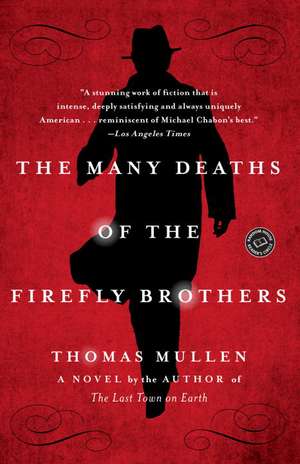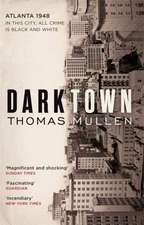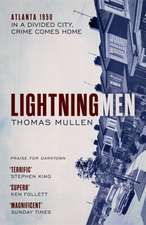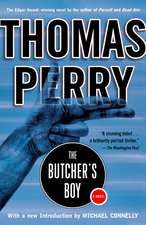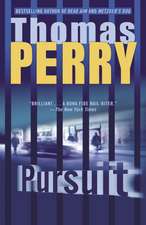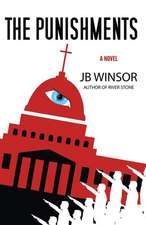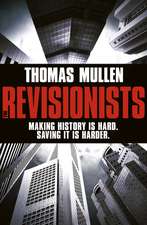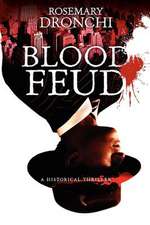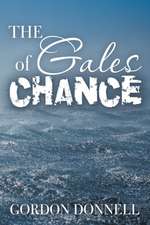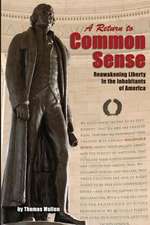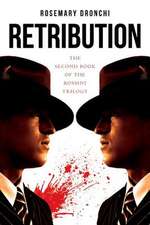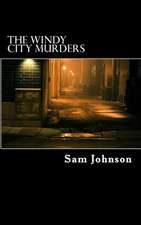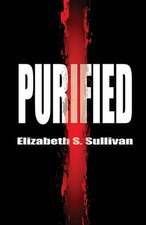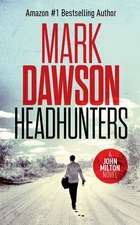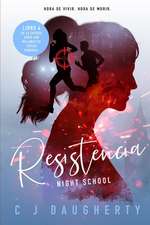The Many Deaths of the Firefly Brothers
Autor Thomas Mullenen Limba Engleză Paperback – 31 ian 2011
Look for special features inside.
Join the Circle for author chats and more.
RandomHouseReadersCircle.com
Preț: 120.26 lei
Nou
Puncte Express: 180
Preț estimativ în valută:
23.01€ • 24.03$ • 19.00£
23.01€ • 24.03$ • 19.00£
Carte tipărită la comandă
Livrare economică 15-29 aprilie
Preluare comenzi: 021 569.72.76
Specificații
ISBN-13: 9780812979299
ISBN-10: 081297929X
Pagini: 415
Dimensiuni: 133 x 204 x 24 mm
Greutate: 0.31 kg
Editura: Random House Trade
ISBN-10: 081297929X
Pagini: 415
Dimensiuni: 133 x 204 x 24 mm
Greutate: 0.31 kg
Editura: Random House Trade
Notă biografică
Thomas Mullen is the author of The Last Town on Earth, which was named Best Debut Novel of the Year by USA Today and Best Book of the Year by Chicago Tribune, and won the James Fenimore Cooper Prize for excellence in historical fiction. He lives in Atlanta with his wife and son.
From the Hardcover edition.
From the Hardcover edition.
Extras
THE FIRST DEATH OF THE FIREFLY BROTHERS
He was a man well accustomed to waking up in unorthodox positions and in all manner of settings. He’d slept on floors, in the pillowless crevices of old couch frames, amid the nettles of haylofts, against the steering wheels of parked cars. Whether it was stationary or in motion, Jason Fireson could sleep on it: he’d snoozed on buses, phaetons, boxcars. He’d nodded off standing up, sitting down, falling over.
But this was something new.
He didn’t know what he was lying on at first. He knew only that he was cold, that his skin was touching metal, and that he was naked. A thin sheet was pulled halfway up his chest.
He had suffered more than his share of automobile accidents and he was familiar with the awful feeling the following mornings. This was worse. He sat up gradually, the muscles and tendons of his neck and arms achingly stiff. He thought that it would have been difficult to imagine being any more sore without being dead.
He inhaled. He was accustomed as well to waking to all nature of scents—to animals in the barn below, or unwashed criminals sweating in a cramped room, or Darcy’s occasional and disastrous breakfasts. But this was a strange, bitter vapor trying in vain to mask more human evidence of body odor, urine, and blood. The room was brightly lit, two overhead lights and desk lamps on either side casting their jaundiced glow. He looked to his left and saw cruel medical implements lying on a narrow metal table, some of them wrapped in gauze or cloth and all of them lying in a pool of dried blood. A hospital room, then. He’d never woken up in one of those before, so add that to the list. It was an unusual hospital, and his eyes took stock of the various items his physicians had left behind. On the same table as those grisly tools was a camera and its tall flash, an empty pack of cigarettes, and an overflowing ashtray.
One of the lamps flickered on and off every few seconds. Heavy footsteps followed invisible paths above the ceiling. He could taste the memory of blood in the back of his throat, and when he swallowed he nearly gagged at the dryness.
The tiled floor was filthy, as if his physicians moonlighted as hog farmers and had tracked mud throughout the sick ward. Ringing the room at waist level was a narrow counter, and in the corner a large radio was precariously balanced on it, the announcer’s smooth voice earnestly recounting the latest WPA project. Most alarming was the policeman’s cap hanging from a hook on the back of a door, framed photographs of unsmiling officers haunting three different walls, and, on the wall behind his bed, the portrait of what Jason figured for a governor—guys with jowls like that just had to be governors—glaring at him like a corpulent god.
He noticed that the fingertips of his left hand were blackened with ink, those five blotches the very picture of guilt, of shame, and some very unfortunate luck indeed.
At the far end of the room a similarly unclothed, half-covered man lay on a cot, pushed up against the wall as if trying to keep as far from Jason Fireson as possible.
Then Jason noticed that it wasn’t a cot.
He lifted himself from elbows to palms, the sheet slipping down to his waist. His eyes widened at the grotesque marks on his chest. They looked like boils that had been lanced with dirty scalpels and had become infected, drying out crusted and black as they sank back into his flesh. Two were in his upper chest just beneath his clavicle, another was a couple of inches southeast of his left nipple, and three more were in his abdomen. Jason had always been proud of his physique, and for a moment—a brief one—his thoughts ran to profound disappointment at the way these wounds marred his well-proportioned pectorals and flat stomach. But he had been shot before—months ago, in his left forearm—and he knew the markings for what they were, even as all rational thought argued the contrary.
In a panic he tore the sheet off his body and let it collapse like a dispelled ghost onto the tiled floor. He wanted to touch the wounds but was afraid to.
“Well this is a hell of a thing.”
He sat there for a moment, then forced his neck to scan the room again. Objects that before had been fuzzy declared themselves. To his right was a third cooling board, which had been obscured from view by a table between them. He thought he knew the face lying in profile upon it—how could he not?—except for the fact that he’d never seen his brother look so peaceful.
Jason stood, the tile cold on his feet, and stared wide-eyed at Whit. He reached forward and hesitantly touched his brother’s stubbly left cheek. It felt cold, but everything felt cold at that moment. He grabbed the sheet that lay up to his brother’s neck, waited a moment, and slowly began to pull it down. In the center of Whit’s chest, like a target, was what could only be a bullet wound.
As he took in this sight he breathed slowly—yes, he was breathing, despite all the metal he must be carrying inside, clanging about like a piggy bank—and leaned forward in grief, involuntarily putting his right hand on his brother’s biceps. It flexed into alertness, and Whit’s head turned toward Jason. Whit’s jaw was clenched and his brows quivered. Then his eyes darted down.
“You’re naked,” Whit said.
“That hardly seems the most noteworthy thing here.” Their voices were hoarse.
Whit sat up, still staring at Jason’s pockmarked chest. Eventually his eyes shifted down to his own body, and he lurched back as if shot again, nearly falling from his cooling board.
“What . . . ?” His voice trailed off.
“I don’t know.”
They stared at each other for a long while, each waiting for the other to explain the situation or to bust up at the practical joke.
Jason swallowed, which hurt, and said, “For the sake of discussion I’m at least going to ask if this has ever happened to you before.”
“Not in my worst dreams.”
“I thought you never remember your dreams.”
“Well, I would think I’d remember something like this!”
“Shh. We’re in a police station, for Chrissake.”
Whit hopped off his cooling board. “Do you remember anything?”
“No.” Jason reversed down his mental map, wildly careening through each turn and over every bump. “I remember being in Detroit, I remember driving with the money to meet with Owney. . . . But that’s it. I don’t remember if we even made it to the restaurant.”
“Me neither. Everything’s all fuzzy.”
Jason felt a sudden need to look back at his own cooling board, in case he was a spirit and had left his husk behind. But no.
Whit started glancing around the room again as if searching for a perfectly rational explanation. Maybe these weren’t bullet wounds but something else.
“How could we . . .” he tried to ask. “How could we have survived this?”
“I don’t know. We’ve survived a lot so far, so why not—”
Whit pointed to his wound. “Look at this, Jason!”
“Shhh. Keep it down, goddamnit. And, no thank you, I’ve looked at it enough.”
Whit turned around. “Where’s the exit wound? Do you think it could have managed to slip out and miss the major organs?”
Jason waved him off without looking. “What about all of mine?”
Whit turned back around and briefly examined his brother’s chest. “I don’t know, maybe they . . .” Then he looked at Jason’s face. “You’re white as a sheet, too.”
Jason lightly slapped his own face. “I’ll get some color once we get out of here. C’mon, let’s figure a way out.”
Whit tapped at his chest. Then he closed his eyes for a moment, opened them. “I don’t feel dead.”
“Thank you for clarifying that.”
“But, I mean, I’m breathing. Are you breathing? How do you feel?”
“I feel stiff but . . . normal.” Indeed, Jason was feeling less sore the more he moved, as if all that his joints needed was to be released from their locked positions. “Shockingly normal. You?”
Whit nodded. “But if we’ve survived this and have been recovering here for a few hours, or days, shouldn’t we . . . feel a little worse?”
“I don’t know, maybe we’re on some crazy medication. Or maybe they used some new kind of bullets. Who knows? Look, a police station isn’t the place to be wondering about this. We don’t have time.”
Jason turned off the radio. A closer inspection of the police hat on the wall informed him that they were in Points North, Indiana. He told Whit.
“Where the hell is Points North?”
“Not far from Valparaiso,” Jason said. The plan had been to pick up the girls at a motel outside Valparaiso after the cash drop-off in Detroit. So had the drop-off been successful, only to have something go wrong when they tried to get the girls?
Jason motioned to the third cooling board at the other end of the room. “Come on, let’s see who our accomplice is. Maybe he has some answers.”
He walked over to the body, Whit following after bunching his sheet around his waist. The man on the third board was every bit as naked under his sheet and every bit as bad off. He was big, once inflated but now sagging, and a gunshot to the left side of his neck had not only left a large wound but had torn at the loose skin, shreds hanging there. The crooked bridge of his nose boasted that he’d survived previous acts of violence before succumbing to this one.
“I don’t know him,” Whit said. “You?”
Jason shook his head. Something in the man’s face, as well as the fact that the doctors or morticians had separated him from them, made Jason certain this was a cop.
“Hey, buddy,” Jason said, a little more loudly. “You awake?” He snapped his fingers over the man’s face, but nothing. Whit slapped the man’s cheek.
“Have some respect,” Jason chided him. He waited a moment, but the slap went unanswered. Then he placed his thumb between the man’s right eye and eyebrow, pressing at the socket of his skull and pulling up to reveal the still, hazel eye beneath. This man seemed content enough in his death not to be fighting it.
“I guess whatever we have isn’t contagious,” Jason said. He patted the corpse’s cold chest. “Okay, buddy. Rest in peace.”
The room had a lone window, small and high on the wall. Twilight was fading, and the clock beside the window called the time quarter past eight. What day was it? Jason had the vague feeling an entire day had passed since his last memory, if not more.
“What the hell happened?” Whit asked again.
“Let’s figure it out later. When we’re very far from here.”
Beyond the dead man’s feet was a wooden door; on its two hooks hung not only an officer’s cap but also a white medical coat, which Jason grabbed. The coat barely cloaked him, and it was so thin it was nearly transparent.
Jason began opening the drawers that lined the left-hand wall, hoping to find something worth taking. He had never been comfortable around doctors, and being alone in a medical room rife with their soiled detritus was even worse. He felt like the fool in an old silent movie who spelunks the depths of a monster’s lair without noticing the shadow growing behind him. He found a roll of surgical tape and some gauze and tossed them to Whit, who gave him a confused look.
“I don’t know, we might need ’em later.”
He continued fumbling among the forceps and pliers and shears that lay on the tables, taking the two longest scalpels and handing one to his brother.
“The window?” Whit asked.
“You can tramp around in the nude if you’d like, but I want some clothes first.”
Jason had broken into and out of several buildings in his time: police stations and armories; the federally monitored homes of friends and family; a county jail; hell, even a moving train. On some of those occasions he had been unarmed, but never unclothed. He felt his nudity was an unfair handicap, the cops violating some essential code.
The room had a second door on the opposite wall. They pressed their ears to one and then the other, deciding that the one by the dead cop was the safest bet—through the other door they’d heard a dull rumble of activity.
Jason turned the doorknob slowly, glanced back at his brother a step behind him, and nodded. Then he leaned his weight into the door, his right hand clutching the scalpel still encrusted with his own blood.
It was a narrow hallway, white tiled floor and unpainted white walls, and just beyond was another door. Through that was a locker room, movable wooden benches lining the walls. It smelled of soap and sweat; an opening in the wall to the left led to some stalls, probably some showers—but all was quiet.
Jason silently opened the few unlocked lockers but found nothing. Whit did the same from the opposite wall until they met in the center.
Despite the speed of Jason’s heartbeat—either his heart was still beating or he could feel the lost echo of such vibrations like an amputee’s phantom pain—he was still cold, and the tile against the soles of his feet caused him to shiver. He stepped back into the middle of the room and found himself in full view of a mirror hanging between two lockers. Distracted as usual by his reflection, he stared at the dark bullet wounds visible through his thin coat. Then he noticed his hair—he ran his fingers through it but still it hung ragged down his forehead.
“They cut off some of my hair. Jesus.”
From the Hardcover edition.
He was a man well accustomed to waking up in unorthodox positions and in all manner of settings. He’d slept on floors, in the pillowless crevices of old couch frames, amid the nettles of haylofts, against the steering wheels of parked cars. Whether it was stationary or in motion, Jason Fireson could sleep on it: he’d snoozed on buses, phaetons, boxcars. He’d nodded off standing up, sitting down, falling over.
But this was something new.
He didn’t know what he was lying on at first. He knew only that he was cold, that his skin was touching metal, and that he was naked. A thin sheet was pulled halfway up his chest.
He had suffered more than his share of automobile accidents and he was familiar with the awful feeling the following mornings. This was worse. He sat up gradually, the muscles and tendons of his neck and arms achingly stiff. He thought that it would have been difficult to imagine being any more sore without being dead.
He inhaled. He was accustomed as well to waking to all nature of scents—to animals in the barn below, or unwashed criminals sweating in a cramped room, or Darcy’s occasional and disastrous breakfasts. But this was a strange, bitter vapor trying in vain to mask more human evidence of body odor, urine, and blood. The room was brightly lit, two overhead lights and desk lamps on either side casting their jaundiced glow. He looked to his left and saw cruel medical implements lying on a narrow metal table, some of them wrapped in gauze or cloth and all of them lying in a pool of dried blood. A hospital room, then. He’d never woken up in one of those before, so add that to the list. It was an unusual hospital, and his eyes took stock of the various items his physicians had left behind. On the same table as those grisly tools was a camera and its tall flash, an empty pack of cigarettes, and an overflowing ashtray.
One of the lamps flickered on and off every few seconds. Heavy footsteps followed invisible paths above the ceiling. He could taste the memory of blood in the back of his throat, and when he swallowed he nearly gagged at the dryness.
The tiled floor was filthy, as if his physicians moonlighted as hog farmers and had tracked mud throughout the sick ward. Ringing the room at waist level was a narrow counter, and in the corner a large radio was precariously balanced on it, the announcer’s smooth voice earnestly recounting the latest WPA project. Most alarming was the policeman’s cap hanging from a hook on the back of a door, framed photographs of unsmiling officers haunting three different walls, and, on the wall behind his bed, the portrait of what Jason figured for a governor—guys with jowls like that just had to be governors—glaring at him like a corpulent god.
He noticed that the fingertips of his left hand were blackened with ink, those five blotches the very picture of guilt, of shame, and some very unfortunate luck indeed.
At the far end of the room a similarly unclothed, half-covered man lay on a cot, pushed up against the wall as if trying to keep as far from Jason Fireson as possible.
Then Jason noticed that it wasn’t a cot.
He lifted himself from elbows to palms, the sheet slipping down to his waist. His eyes widened at the grotesque marks on his chest. They looked like boils that had been lanced with dirty scalpels and had become infected, drying out crusted and black as they sank back into his flesh. Two were in his upper chest just beneath his clavicle, another was a couple of inches southeast of his left nipple, and three more were in his abdomen. Jason had always been proud of his physique, and for a moment—a brief one—his thoughts ran to profound disappointment at the way these wounds marred his well-proportioned pectorals and flat stomach. But he had been shot before—months ago, in his left forearm—and he knew the markings for what they were, even as all rational thought argued the contrary.
In a panic he tore the sheet off his body and let it collapse like a dispelled ghost onto the tiled floor. He wanted to touch the wounds but was afraid to.
“Well this is a hell of a thing.”
He sat there for a moment, then forced his neck to scan the room again. Objects that before had been fuzzy declared themselves. To his right was a third cooling board, which had been obscured from view by a table between them. He thought he knew the face lying in profile upon it—how could he not?—except for the fact that he’d never seen his brother look so peaceful.
Jason stood, the tile cold on his feet, and stared wide-eyed at Whit. He reached forward and hesitantly touched his brother’s stubbly left cheek. It felt cold, but everything felt cold at that moment. He grabbed the sheet that lay up to his brother’s neck, waited a moment, and slowly began to pull it down. In the center of Whit’s chest, like a target, was what could only be a bullet wound.
As he took in this sight he breathed slowly—yes, he was breathing, despite all the metal he must be carrying inside, clanging about like a piggy bank—and leaned forward in grief, involuntarily putting his right hand on his brother’s biceps. It flexed into alertness, and Whit’s head turned toward Jason. Whit’s jaw was clenched and his brows quivered. Then his eyes darted down.
“You’re naked,” Whit said.
“That hardly seems the most noteworthy thing here.” Their voices were hoarse.
Whit sat up, still staring at Jason’s pockmarked chest. Eventually his eyes shifted down to his own body, and he lurched back as if shot again, nearly falling from his cooling board.
“What . . . ?” His voice trailed off.
“I don’t know.”
They stared at each other for a long while, each waiting for the other to explain the situation or to bust up at the practical joke.
Jason swallowed, which hurt, and said, “For the sake of discussion I’m at least going to ask if this has ever happened to you before.”
“Not in my worst dreams.”
“I thought you never remember your dreams.”
“Well, I would think I’d remember something like this!”
“Shh. We’re in a police station, for Chrissake.”
Whit hopped off his cooling board. “Do you remember anything?”
“No.” Jason reversed down his mental map, wildly careening through each turn and over every bump. “I remember being in Detroit, I remember driving with the money to meet with Owney. . . . But that’s it. I don’t remember if we even made it to the restaurant.”
“Me neither. Everything’s all fuzzy.”
Jason felt a sudden need to look back at his own cooling board, in case he was a spirit and had left his husk behind. But no.
Whit started glancing around the room again as if searching for a perfectly rational explanation. Maybe these weren’t bullet wounds but something else.
“How could we . . .” he tried to ask. “How could we have survived this?”
“I don’t know. We’ve survived a lot so far, so why not—”
Whit pointed to his wound. “Look at this, Jason!”
“Shhh. Keep it down, goddamnit. And, no thank you, I’ve looked at it enough.”
Whit turned around. “Where’s the exit wound? Do you think it could have managed to slip out and miss the major organs?”
Jason waved him off without looking. “What about all of mine?”
Whit turned back around and briefly examined his brother’s chest. “I don’t know, maybe they . . .” Then he looked at Jason’s face. “You’re white as a sheet, too.”
Jason lightly slapped his own face. “I’ll get some color once we get out of here. C’mon, let’s figure a way out.”
Whit tapped at his chest. Then he closed his eyes for a moment, opened them. “I don’t feel dead.”
“Thank you for clarifying that.”
“But, I mean, I’m breathing. Are you breathing? How do you feel?”
“I feel stiff but . . . normal.” Indeed, Jason was feeling less sore the more he moved, as if all that his joints needed was to be released from their locked positions. “Shockingly normal. You?”
Whit nodded. “But if we’ve survived this and have been recovering here for a few hours, or days, shouldn’t we . . . feel a little worse?”
“I don’t know, maybe we’re on some crazy medication. Or maybe they used some new kind of bullets. Who knows? Look, a police station isn’t the place to be wondering about this. We don’t have time.”
Jason turned off the radio. A closer inspection of the police hat on the wall informed him that they were in Points North, Indiana. He told Whit.
“Where the hell is Points North?”
“Not far from Valparaiso,” Jason said. The plan had been to pick up the girls at a motel outside Valparaiso after the cash drop-off in Detroit. So had the drop-off been successful, only to have something go wrong when they tried to get the girls?
Jason motioned to the third cooling board at the other end of the room. “Come on, let’s see who our accomplice is. Maybe he has some answers.”
He walked over to the body, Whit following after bunching his sheet around his waist. The man on the third board was every bit as naked under his sheet and every bit as bad off. He was big, once inflated but now sagging, and a gunshot to the left side of his neck had not only left a large wound but had torn at the loose skin, shreds hanging there. The crooked bridge of his nose boasted that he’d survived previous acts of violence before succumbing to this one.
“I don’t know him,” Whit said. “You?”
Jason shook his head. Something in the man’s face, as well as the fact that the doctors or morticians had separated him from them, made Jason certain this was a cop.
“Hey, buddy,” Jason said, a little more loudly. “You awake?” He snapped his fingers over the man’s face, but nothing. Whit slapped the man’s cheek.
“Have some respect,” Jason chided him. He waited a moment, but the slap went unanswered. Then he placed his thumb between the man’s right eye and eyebrow, pressing at the socket of his skull and pulling up to reveal the still, hazel eye beneath. This man seemed content enough in his death not to be fighting it.
“I guess whatever we have isn’t contagious,” Jason said. He patted the corpse’s cold chest. “Okay, buddy. Rest in peace.”
The room had a lone window, small and high on the wall. Twilight was fading, and the clock beside the window called the time quarter past eight. What day was it? Jason had the vague feeling an entire day had passed since his last memory, if not more.
“What the hell happened?” Whit asked again.
“Let’s figure it out later. When we’re very far from here.”
Beyond the dead man’s feet was a wooden door; on its two hooks hung not only an officer’s cap but also a white medical coat, which Jason grabbed. The coat barely cloaked him, and it was so thin it was nearly transparent.
Jason began opening the drawers that lined the left-hand wall, hoping to find something worth taking. He had never been comfortable around doctors, and being alone in a medical room rife with their soiled detritus was even worse. He felt like the fool in an old silent movie who spelunks the depths of a monster’s lair without noticing the shadow growing behind him. He found a roll of surgical tape and some gauze and tossed them to Whit, who gave him a confused look.
“I don’t know, we might need ’em later.”
He continued fumbling among the forceps and pliers and shears that lay on the tables, taking the two longest scalpels and handing one to his brother.
“The window?” Whit asked.
“You can tramp around in the nude if you’d like, but I want some clothes first.”
Jason had broken into and out of several buildings in his time: police stations and armories; the federally monitored homes of friends and family; a county jail; hell, even a moving train. On some of those occasions he had been unarmed, but never unclothed. He felt his nudity was an unfair handicap, the cops violating some essential code.
The room had a second door on the opposite wall. They pressed their ears to one and then the other, deciding that the one by the dead cop was the safest bet—through the other door they’d heard a dull rumble of activity.
Jason turned the doorknob slowly, glanced back at his brother a step behind him, and nodded. Then he leaned his weight into the door, his right hand clutching the scalpel still encrusted with his own blood.
It was a narrow hallway, white tiled floor and unpainted white walls, and just beyond was another door. Through that was a locker room, movable wooden benches lining the walls. It smelled of soap and sweat; an opening in the wall to the left led to some stalls, probably some showers—but all was quiet.
Jason silently opened the few unlocked lockers but found nothing. Whit did the same from the opposite wall until they met in the center.
Despite the speed of Jason’s heartbeat—either his heart was still beating or he could feel the lost echo of such vibrations like an amputee’s phantom pain—he was still cold, and the tile against the soles of his feet caused him to shiver. He stepped back into the middle of the room and found himself in full view of a mirror hanging between two lockers. Distracted as usual by his reflection, he stared at the dark bullet wounds visible through his thin coat. Then he noticed his hair—he ran his fingers through it but still it hung ragged down his forehead.
“They cut off some of my hair. Jesus.”
From the Hardcover edition.
Recenzii
“A stunning work of fiction that is intense, deeply satisfying and always uniquely American . . . reminiscent of Michael Chabon’s best.”—Los Angeles Times
“A complex brain-teaser . . . riveting . . . Mullen’s absorbing tale of larger-than-life criminals, car chases, and shootouts is not to be missed.”—The Atlanta Journal-Constitution
“Magic noirism . . . wonderfully illuminates why 1930s America spawned so many dark heroes, and how similar that depression was at times to the recession we’re experiencing now.”—The New York Times Book Review
“Stylish storytelling [that] brings to life an earlier era to speak to our own . . . Mullen is a spirited writer, delivering consistently smart dialogue. . . . The women of the novel . . . form its emotional core.”—The Boston Globe
“A full-throttle page-turner [with] a palpable sense of time and place . . . a high-wire balance of historical fiction and pulp fantasy”—Toronto Star
“A complex brain-teaser . . . riveting . . . Mullen’s absorbing tale of larger-than-life criminals, car chases, and shootouts is not to be missed.”—The Atlanta Journal-Constitution
“Magic noirism . . . wonderfully illuminates why 1930s America spawned so many dark heroes, and how similar that depression was at times to the recession we’re experiencing now.”—The New York Times Book Review
“Stylish storytelling [that] brings to life an earlier era to speak to our own . . . Mullen is a spirited writer, delivering consistently smart dialogue. . . . The women of the novel . . . form its emotional core.”—The Boston Globe
“A full-throttle page-turner [with] a palpable sense of time and place . . . a high-wire balance of historical fiction and pulp fantasy”—Toronto Star
